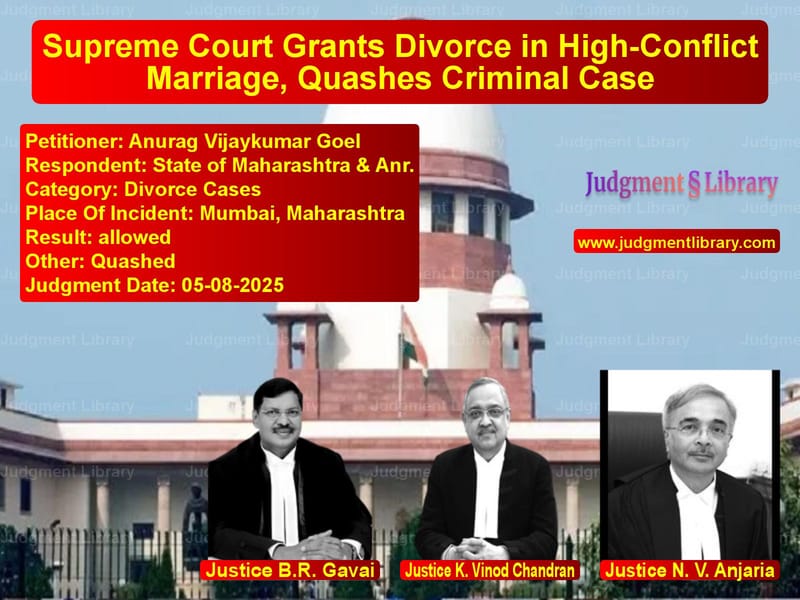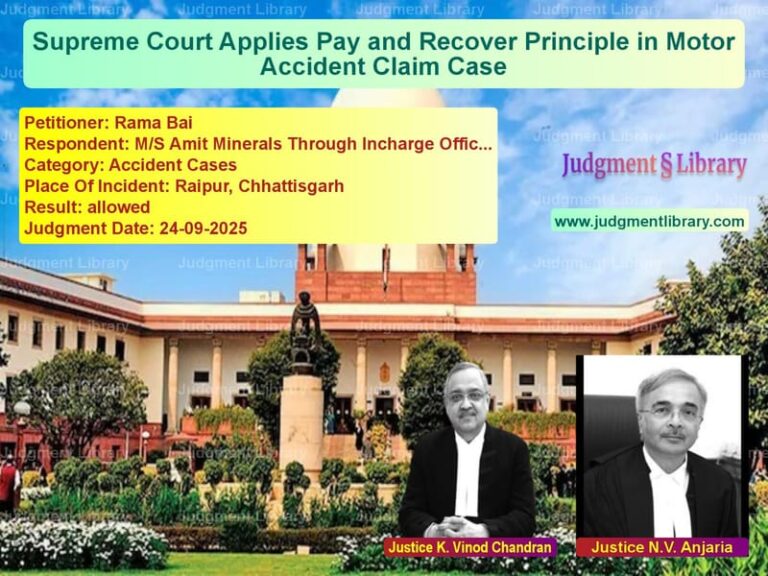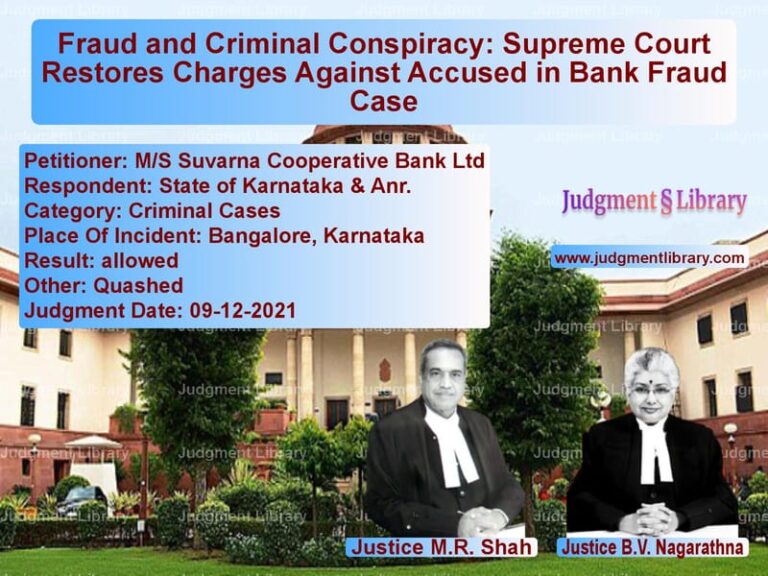Supreme Court Grants Divorce in High-Conflict Marriage, Quashes Criminal Case
In a landmark judgment that highlights the complexities of modern marital relationships, the Supreme Court of India recently delivered a comprehensive verdict in a high-conflict divorce case that had been dragging through courts for eight long years. The case involved Anurag Vijaykumar Goel and his wife, whose brief marriage of just one year and nine months spawned multiple legal battles across different courts in the country. Both parties had been previously divorced and attempted to find happiness in this second marriage, which unfortunately ended in bitter acrimony and extensive litigation.
The Background of the Case
The marriage between Anurag Goel and his wife took place on July 25, 2015, but the relationship quickly deteriorated. The husband claimed he left their Mumbai apartment and moved to Faridabad to stay with his parents and his autistic child from his first marriage due to constant harassment from his wife. The wife, however, presented a completely different narrative, alleging continued intimidation and domestic violence that forced her to bring her parents to live with her in what was their matrimonial home.
The legal battles began with a complaint filed by the wife under Section 498-A of the Indian Penal Code, which deals with cruelty against married women. This led to the registration of an FIR and criminal prosecution against the husband. Simultaneously, the wife initiated proceedings under the Domestic Violence Act against the husband and his parents, while the husband filed for divorce in Delhi. The case became a classic example of how marital discord can escalate into multiple legal proceedings across different jurisdictions.
The Settlement That Almost Worked
Amidst this legal chaos, there was a brief period of hope when both parties agreed to mediation through the Principal Counsellor of the Family Court in Saket, New Delhi. On September 1, 2022, they signed a settlement agreement that seemed to provide a way out of their troubled marriage. The agreement was comprehensive – it required the husband to gift his prime Mumbai apartment to the wife, while she agreed to clear the outstanding loan on the property. The wife even handed over a demand draft of approximately Rs. 10 lakhs to settle the loan on September 14, 2022, when the first motion for divorce by mutual consent was recorded by the Family Court.
However, just when it seemed the matter was heading toward resolution, the wife resiled from the agreement before the second motion for divorce. This prompted the husband to approach the Bombay High Court seeking quashing of the criminal proceedings, arguing that the settlement justified such action. The wife’s withdrawal from the settlement also led to contempt proceedings in the Delhi High Court, though these were eventually set aside by a Division Bench.
The Arguments Before the Supreme Court
When the matter reached the Supreme Court, Senior Counsel Madhavi Diwan, representing the husband, made compelling arguments. She pointed out that “the respondent had acted as per the settlement and then resiled from it without reasonable cause; obviously with the intention to coerce the appellant into a better settlement.” The husband’s counsel emphasized his current financial constraints, noting that he had resigned from his job to join his aged parents who were unable to look after his autistic child. Despite his reduced financial capacity, the husband remained willing to honor the original settlement terms, including transferring the Mumbai apartment valued at approximately Rs. 4 crores.
The wife, appearing in person, presented a starkly different perspective. She argued that “the respondent does not have a job and the appellant is still lucratively employed.” She produced the husband’s LinkedIn profile and income tax returns to support her claim that he continued to work with Citi Bank and had substantial income from other sources. The wife vehemently opposed the settlement terms and made serious allegations, claiming that “the agreement was entered into under coercion, misrepresentation and fraud employed by the appellant on the respondent.” She dramatically increased her demands, seeking permanent alimony of Rs. 12 crores in addition to the encumbrance-free ownership of the apartment.
The Court’s Critical Analysis
The Supreme Court bench comprising Justices B.R. Gavai, K. Vinod Chandran, and N.V. Anjaria conducted a thorough examination of the facts and legal issues. The court made several crucial observations that shaped its final decision. Regarding the criminal case under Section 498-A, the judges noted that “the allegations in the statement of 19.04.2018 based on which the crime was registered against the appellant inter-alia under Section 498-A are common-place, banal and vague, without any specific instances mentioned and filed one year after the admitted separation of the couple.”
The court was particularly critical of how ordinary marital disputes had been escalated into criminal proceedings, observing that “we perceive nothing more than ordinary marital squabbles, skirmishes and bickerings blown out of proportion; often leading to eternal strife, then estrangement and eventually divorce, as has been the trajectory in this case too.” This observation highlights the court’s concern about the misuse of criminal provisions in matrimonial disputes.
The Invocation of Article 142
Faced with an irretrievable breakdown of marriage and multiple pending proceedings, the Supreme Court decided to exercise its extraordinary powers under Article 142 of the Constitution. This provision allows the court to pass any decree or order necessary for doing complete justice in any matter. The bench justified this approach by stating that “the invocation of Article 142 is imperative in the above case to do complete justice to both the parties, on being satisfied that the marriage has been rendered totally unworkable, emotionally dead and beyond salvation.”
The court dissolved the marriage on the ground of irretrievable breakdown, noting that “the facts as detailed by us herein above and the acrimonious relations between the parties for the last 8 years without any let-up and the multiple legal proceedings pending, clearly indicate that the relationship has irretrievably broken down.”
The Financial Settlement
In determining the financial terms of the divorce, the court considered several factors. It noted that the wife was “a graduate Engineer with a Post-Graduate qualification in Management and was admittedly working, even at the time of the estrangement.” The court also examined the husband’s income tax returns, which showed a significant decline in his earnings from over Rs. 2.5 crores annually during his employment with Citi Bank to just Rs. 17.73 lakhs in 2021-22.
The bench rejected the wife’s claim for additional alimony, stating that “Further claim of alimony is not justified, especially looking at the appellant’s status which as of now is of an unemployed person.” The court found that the gift of the Mumbai apartment, along with two car parking spaces, would sufficiently provide for the wife’s needs, especially given her educational qualifications and employment potential.
The Final Terms and Conditions
The Supreme Court laid down specific terms for the implementation of its judgment. The husband was directed to pay all outstanding maintenance charges for the apartment society, which had accumulated to approximately Rs. 25.90 lakhs as of January 2025. He was also required to execute a gift deed for the Mumbai apartment in favor of the wife by August 30, 2025. The court provided detailed procedural instructions for the registration of the gift deed, including contingency plans if either party failed to cooperate.
Most significantly, the court quashed all criminal proceedings arising from the marital dispute, stating that “All proceedings, civil and criminal, initiated by the parties to the marriage now dissolved, in relation to or arising out of such marriage, shall stand closed. There shall also be no further proceedings, both civil and criminal instituted, by the respective parties, on any aspect arising out of in relation to the marriage.”
Broader Implications
This judgment has significant implications for matrimonial law in India. It demonstrates the Supreme Court’s willingness to use its powers under Article 142 to resolve long-pending marital disputes where the relationship has clearly broken down beyond repair. The court’s approach also signals a cautious stance toward criminal cases arising from marital disputes, particularly when allegations appear to be general and unspecific.
The judgment balances the rights and interests of both parties – ensuring adequate financial provision for the wife while recognizing the husband’s responsibilities toward his special needs child from his first marriage. It also acknowledges the wife’s educational qualifications and employment potential as relevant factors in determining alimony.
This case serves as a reminder that while the legal system provides remedies for genuine grievances in marriage, these should not be used as weapons in marital warfare. The Supreme Court’s intervention brought closure to an eight-year legal battle, allowing both parties to move forward with their lives while providing a template for resolving similar high-conflict divorce cases in the future.
Petitioner Name: Anurag Vijaykumar Goel.Respondent Name: State of Maharashtra & Anr..Judgment By: Justice B.R. Gavai, Justice K. Vinod Chandran, Justice N. V. Anjaria.Place Of Incident: Mumbai, Maharashtra.Judgment Date: 05-08-2025.Result: allowed.
Don’t miss out on the full details! Download the complete judgment in PDF format below and gain valuable insights instantly!
Download Judgment: anurag-vijaykumar-go-vs-state-of-maharashtra-supreme-court-of-india-judgment-dated-05-08-2025.pdf
Directly Download Judgment: Directly download this Judgment
See all petitions in Mutual Consent Divorce
See all petitions in Alimony and Maintenance
See all petitions in Domestic Violence
See all petitions in Property Division in Divorce Cases
See all petitions in Judgment by B R Gavai
See all petitions in Judgment by K. Vinod Chandran
See all petitions in Judgment by N.V. Anjaria
See all petitions in allowed
See all petitions in Quashed
See all petitions in supreme court of India judgments August 2025
See all petitions in 2025 judgments
See all posts in Divorce Cases Category
See all allowed petitions in Divorce Cases Category
See all Dismissed petitions in Divorce Cases Category
See all partially allowed petitions in Divorce Cases Category







